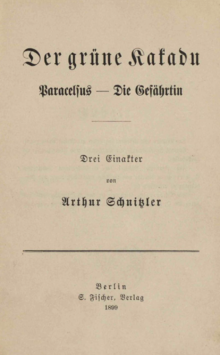Die Gefährtin

Die Gefährtin is a one-act play by Arthur Schnitzler, which premiered on 1 March 1899[2] at the Burgtheater. In the same year, S. Fischer in Berlin published the text edition together with the one-act plays Der grüne Kakadu and .
In a first version, Schnitzler had already developed the material of a husband who has to revise his view of marriage after the death of his wife in the novella Der Wittwer published in 1894.[3] This became the model from which Schnitzler dramatically developed the material from 1896.
Time and location[]
The play is set on an autumn evening towards the end of the 19th century in a summer resort near Vienna.
Content[]
The mourners believe that Robert never loved Eveline, who died of a myocardial infarction. The professor acts accordingly. He wants to forget; throw himself into academic work. His neighbour Olga Merholm appears and wants letters back that she had once written to Eveline. In the course of the dialogue between the two neighbours, the viewer learns that Robert saw Eveline as a lover, not a companion. Worse still, Robert lets slip that his wife had an affair with his friend Doctor Alfred Hausmann during his lifetime. This began three years ago.[4]
Alfred arrives at the news of her death. It soon becomes clear to Robert that everything was completely different. Alfred has been married to a Viennese woman for two years. Despite this surprising clarification, the newcomer is chased out by the master of the house. Alfred leaves.
Olga enlightens Robert and the audience. Alfred has not betrayed Robert. Eveline knew about Alfred's impending marriage. This is also clear from the letters Olga wants back. Robert does not understand this at all. If Olga knew everything, why didn't she tell him? Olga can only regret Eveline's life of loneliness.[5]
Parts[]
- Professor Robert Pilgram
- Doktor Alfred Hausmann
- Professor Werkmann
- Professor Brand
- Olga Merholm
- Ein Diener
Reception[]
- Alfred Kerr also praises Schnitzler's drama because it contains the elements of "concealment" and the renunciation of "completeness".[6] In Die Gefährtin, the exact truth of the assertion of the above. Theatre critic can be demonstrated, for example, with the character of Olga Merholm. The spectator, however, has to think until he comes to it: the widower Professor Pilgram, blinded during his wife's lifetime, has sought the proximity of the married neighbour Olga Merholm.[7] Now that his friend Doctor Alfred Hausmann has opened his eyes about his relationship with the deceased Eveline, the widower comes clean. He leaves the summer resort. The professor thus distances himself from the neighbour who deliberately kept him in the dark.
- The play demonstrates the futurelessness of bourgeois marriage (Scheible).[8]
- In his short review, Hermann Korte classifies the play as "analytic drama".[9]
Film adaptations[]
- Die Gefährtin. Director: Alfred Braun. ARD, SFB anno 1954. Actors: , Günther Hadank, Wolfgang Lukschy.
- Die Gefährtin. Director: . ARD, WDR anno 1966. Actors: , , Hannes Siegl.
Radio plays[]
Hörspiele, Einträge 28 und 29
- Die Gefährtin – directed by , 12 May 1946 vom ORF-Studio Wien gesendet.
- Die Gefährtin – directed by , 20 December 1975 broadcast by ORF and SFB. Actors: , Aglaja Schmid, Kurt Heintel, , , and Leopold Rudolf.
Further reading[]
- Source
- Arthur Schnitzler: Die Gefährtin. Schauspiel in einem Akt. pp. 259–277 in Heinz Ludwig Arnold (ed.): Arthur Schnitzler: Reigen. Die Einakter. Mit einem Nachwort von Hermann Korte. S. Fischer, Frankfurt 1961 (2000 edition). 602 pages, ISBN 3-10-073557-9
- First edition
- Arthur Schnitzler: Der grüne Kakadu – – Die Gefährtin. S. Fischer Berlin 1899.
- Later editions
- Therese Nickl (ed.), (ed.): Arthur Schnitzler. Jugend in Wien. Eine Autobiographie. Mit einem Nachwort von Friedrich Torberg. Fischer Taschenbuch. Frankfurt 2006. 381 pages, ISBN 978-3-596-16852-1 (© Verlag , Vienna 1968)
- : Arthur Schnitzler. rowohlts monographien. Rowohlt Taschenbuch Verlag, Reinbek bei Hamburg Februar 1976 (December 1990 edition). 160 pages, ISBN 3-499-50235-6
- : Geschichte der deutschsprachigen Literatur 1870–1900. Von der Reichsgründung bis zur Jahrhundertwende. C.H. Beck, Munich 1998, ISBN 3-406-44104-1
- Gero von Wilpert: Lexikon der Weltliteratur. Deutsche Autoren A – Z. p. 555, 2nd column, 20. Z.v.u. Stuttgart 2004. 698 pages, ISBN 3-520-83704-8
References[]
- ^ Der grüne Kakadu, Paracelsus, Die Gefährtin (on Google Books)
- ^ "Theaterzettel der Uraufführung". 1899-03-01. Retrieved 24 May 2021.
- ^ Sprengel, p. 452, 13th line from below
- ^ Die Gefährtin at Theatre des Wandels
- ^ Arthur Schnitzler - Die Gefährtin on Events.at
- ^ Cited in the epilogue of the source, p. 597, 2. c.v.o.: Alfred Kerr: Das neue Drama. Berlin 1920 (2nd edition), p. 74
- ^ Source, p. 264 above
- ^ Scheible, p. 73 11. Z.v.o.
- ^ Source, p. 595, 4. Z.v.o.
External links[]
- Die Gefährtin In: Projekt Gutenberg-DE.
- Gabi Stockmann: Short review
- Austrian literature
- Plays by Arthur Schnitzler
- 1899 in theatre